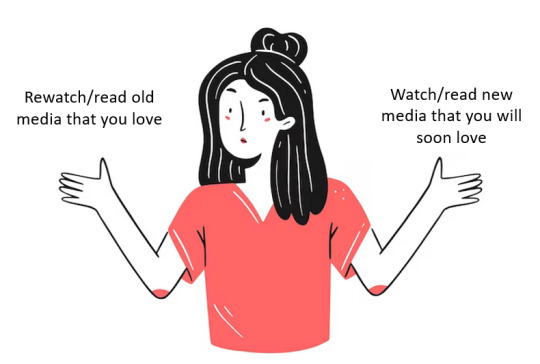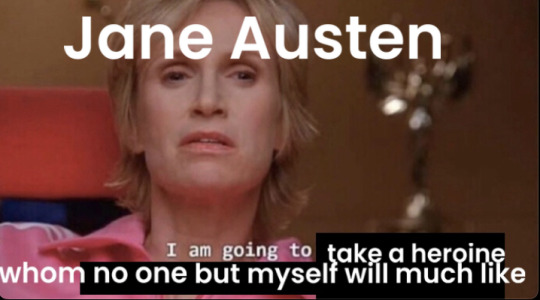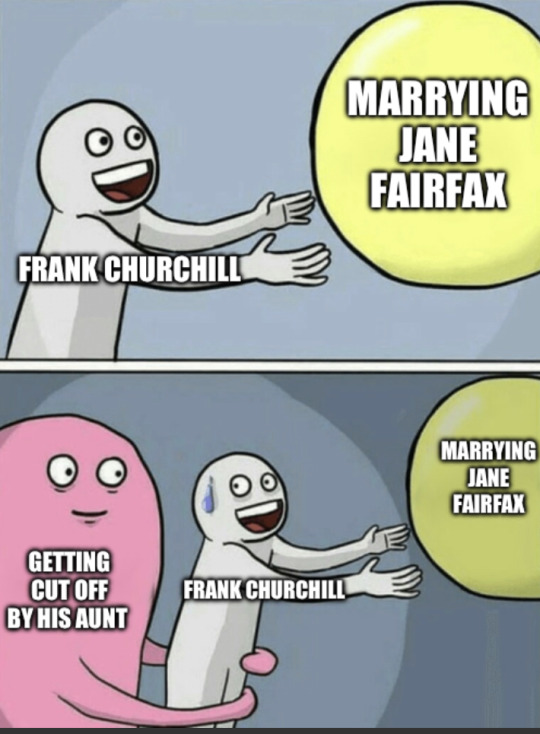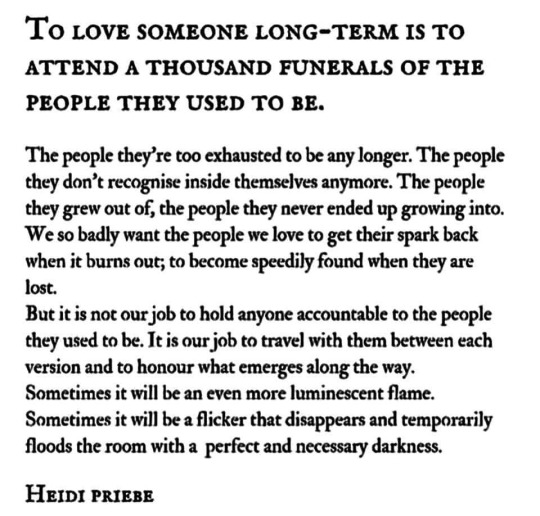"The person, be it gentleman or lady, who has not pleasure in a good novel, must be intolerably stupid."
Don't wanna be here? Send us removal request.
Text
tiktokers who say classic lit is bad because its not relatable 1. thats not the fucking point 2. you've clearly never read twelfth night as a trans bisexual
68K notes
·
View notes
Text
If Jane Bennet was the narrator of Pride and Prejudice, we'd have a new type of unreliable narrator that I can't personally think of any examples of in literature (though they are common in real life) where the person is too nice to describe immoral and/or foolish characters and their motives accurately.
4K notes
·
View notes
Text
The Narrator of Rebecca and Jane Eyre of Jane Eyre are so similar in some ways, but in one important thing, completely opposing.
Both come from poor backgrounds, they are women of the fringe of the gentry who must work to live, they believe themselves to be physically unattractive, they fall in love with a much older man, they come to a house haunted by that man's previous wife, and they have a rich imagination (Jane's paintings, The Narrator's flights of fancy). They are also both desperate to be loved.
But then the similarities stop. When Jane Eyre learns that Rochester has a living wife, she chooses morality and flees. She values her immortal soul over earthly love. The Narrator learns that her husband murdered his previous wife and love is all that matters to her. He never loved Rebecca, he loves her. She is willing to risk anything and everything to help him cover that crime. His confession brings her closer instead of tearing them apart.
"I care for myself. The more solitary, the more friendless, the more unsustained I am, the more I will respect myself. I will keep the law given by God; sanctioned by man. I will hold to the principles received by me when I was sane, and not mad—as I am now. Laws and principles are not for the times when there is no temptation: they are for such moments as this, when body and soul rise in mutiny against their rigour; stringent are they; inviolate they shall be. If at my individual convenience I might break them, what would be their worth? They have a worth—so I have always believed; and if I cannot believe it now, it is because I am insane—quite insane: with my veins running fire, and my heart beating faster than I can count its throbs. Preconceived opinions, foregone determinations, are all I have at this hour to stand by: there I plant my foot.” -Jane Eyre
Vs.
Our happiness had not come too late. I was not young anymore. I was not shy. I was not afraid. I would fight for Maxim. I would lie and perjure and swear, I would blaspheme and pray. Rebecca had not won. Rebecca had lost. -Rebecca
It's such a different worldview, and I also didn't feel like Maxim deserved such unlimited devotion given how he had treated her (I mean does Rochester either?), but as a Romantic love story I was down. If it was a real life choice, I have to run for the moors with Jane.
312 notes
·
View notes
Text
Jane Austen heroines exist on a sliding scale of "You are always right, and no one ever listens to you" (Fanny Price) to "You are never right, and everyone always listens to you" (Emma Woodhouse.)
3K notes
·
View notes
Text
If you see this you’re legally obligated to reblog and tag with the book you’re currently reading
357K notes
·
View notes
Text
So another interesting thing about Jane Eyre is it's take on relationship inequality.
Like, Jane is 18 at the beginning of the story and Rochester is said to be something like 35-38. And it's not casually brushed aside like that was normal back in the day. It wasn't. Concerns about the age gap are raised within the text. But the story emphasizes that Jane feels comfortable accepting Rochester's proposal, despite the age difference, the class difference, and him being her boss, because Jane feels that Rochester regards her as an equal. When they converse, Jane doesn't feel any tension, like she has to impress him or try to read his mind and say whatever he wants to hear. She feels that he respects her and values her thoughts and isn't compelled to use his power against her if she says something to displease him. Around the midpoint of the story, Jane believes that Rochester is going to marry another woman, and resolves to leave because she's heartbroken, believing that because she is poor and plain Rochester can't possibly be as hurt by their parting as she is, and he'll forget her and move on long before she does. But it turns out to be the opposite. After finding out about Bertha, Rochester begs Jane to stay and insists he'll be miserable forever without her, while Jane, still thinking she's too poor and plain to ever attract someone like him again, resists all temptation and leaves him. And she does this specifically because she feels that if she were to compromise her morals and self-respect to be Mr. Rochester's mistress, then he would lose respect for her and the relationship would fall apart. It was only by maintaining her integrity that the relationship could stay in-tact when the reconciled at the end.
St. John Rivers on the other hand, I don't think is given a definite age, but I think he's intended to be a much younger man, probably in his early 20s. He is poor and without relations aside from his sisters or any other connections, just as Jane. Jane finds out they're actually cousins at the same time she learns she's come into a vast fortune that was willed to her rather than the Rivers, but decides to share her fortune equally with them. So she arguably had more social capital, even though she made an effort to put St. John on equal footing with her, because the money was hers by right and she could've presumably cut him off at any time, just as easily as Rochester could've terminated Jane from her job.
And yet, Jane's relationship with St. John is vastly more unequal than her relationship with Rochester. Even though Jane practically worshiped Rochester but only cares for St. John as a brother and is acutely aware of his faults, she still finds herself desperately craving his approval in a way she never did with Rochester. And St. John is willing to exploit that intentionally. He asks her to do things she doesn't want to and make sacrifices for him just because he knows she'll do anything to please him, and that's why he thinks she's the perfect wife for him. Where Rochester tries to explain himself and persuade Jane not to leave him by addressing her concerns, St. John basically tries to command Jane to marry him and refuses to accept her "no" as final. He withholds affection from Jane as a tactic to get her to compromise in order to reconcile with him when he's the one who should be apologizing to her and considering her needs and not just his own. Jane knows that she can't ever be happy with him because he doesn't respect her and his lack of respect only makes her want to seek his approval, which he is all too happy to exploit for his own benefit.
But Jane ultimately stays firm and rejects St. John's proposal of a loveless marriage, just as she rejected Rochester's proposal of an unlawful marriage, because both situations were doomed to fail if she didn't put her own self-respect first.
So this novel from 1847 was really saying that power dynamics aren't pure black and white. Age and class and wealth and status can be a factor in making a relationship unequal, but you can also be equal on pretty much all social axis and still have inequality in a relationship. What's really important is that there's mutual respect.
3K notes
·
View notes
Text
"Besides, I've done enough bad things in my life. I keep telling people I've repaid my debts, but I can't tell that same lie to you. I know I've caused a lot more pain than I've ever had to feel myself. A lot more by a long shot."
Die a Stranger, Steve Hamilton
#die a stranger#steve hamilton#alex mcknight series#michigan author#mystery#mystery thriller#midwest thriller#midwest mystery#pain#mistakes#literature
0 notes
Text
jane austen writing a man who said "there is no reason why you should not be important where you are known" to a woman is why my standards are so high
89 notes
·
View notes
Text
Look, I actually like Edmund Bertram but it's kind of hilarious how wrong he is in this book. He thinks Maria just isn't a romantic person. He sees Mary Crawford's sketchy morals and wants to, like, save her basically? And "[Henry Crawford] has no faults but what a serious attachment would remove." Bro? Really??
107 notes
·
View notes
Text
Accidentally started rereading Northanger Abbey, and was sudden reminded all over again that Jane Austen is, in fact, fucking hilarious.
NA is her parody/satire of Gothic novels at the time, and she starts the book by choosing violence-- she describes the "tragedy" of the main character, Catherine Morland, a girl Determined to be a Heroine even though ALL ODDS are against her: she has a sane father who doesn't lock up his daughters, a healthy mother who didn't die in childbirth, no preternatural talent for music or drawing through which to reveal her Deepest Soul, and-- most shockingly of all-- absolutely zero love interests for whom she can wander the hills mourning their starcrossed fates until she wastes away from the sheer Sentimentality of it all.
But don't worry! She's got this FIGURED OUT. She KNOWS why she has not yet found her TRUE LOVE:
There was not one lord in the neighbourhood; no—not even a baronet. There was not one family among their acquaintance who had reared and supported a boy accidentally found at their door—not one young man whose origin was unknown. Her father had no ward, and the squire of the parish no children.
But when a young lady is to be a heroine, the perverseness of forty surrounding families cannot prevent her. Something must and will happen to throw a hero in her way.
(SPOILER: She is introduced to a mysterious young man who lives in an ABBEY, which everyone knows means he has a DEEPLY MYSTERIOUS SECRET PAST and is maybe a TRAGIC HERO or even a ROMANTIC MONSTER and either way this is IT this is Catherine's TIME TO SHINE she is going to get a good grade in DOOMED LOVE, a thing that is normal to want and--)
(...meanwhile Henry Tilney-- an ordinary guy who never expected "get cast as the Hero in some Grand Gothic Romance" to show up on his bingo card-- starts wondering when exactly he started finding Catherine's attempts to locate bloody daggers in his linen closet charming.)
2K notes
·
View notes
Text
Life is full of extremely difficult choices:

Though sometimes you also have to do the laundry, which is THE HORRORS
188 notes
·
View notes
Text
top 3 favorite books i read in 2023!
3. Mansfield Park by Jane Austen
timid, shy, insecure protagonist who does NOT try to get between her crush and the girl he's going for, has a wonderful relationship with her older brother, and ultimately just wants to be loved and accepted by those around her.
her return to her parents' home is realistically heartbreaking. it isn't that anyone is mean to Fanny - they ignore her.
the entire play fiasco is so juicy and fun to read!!
we get to witness the romantic interest go through his own fall and redemption arc & we as the audience have to sit back and just watch him grow and find himself rather than be alongside him, which is simultaneously frustrating yet a unique experience :)
i honestly thought that henry could have his own redemption arc & was surprised when he instead fell again...this time harder than before...the drama.......
2. Villette by Charlotte Brontë
sad, lonely, traumatized protagonist who is also such a badass. she will not tell us what tragedies she has had to face....so mysterious... i love her
she literally moves to a foreign country where she doesn't speak the language & doesn't have credentials to teach and she just....learns the language and becomes a teacher. she gains respect from the students and staff even if she is still a bit of an outcast
the nun subplot.....so fun and supernatural and the truth of who the nun is was just so damn funny
the graham reveal!!!
the way lucy is treated when she experiences depression, loneliness, and anxiety is so necessary and realistic for her character & all that she's gone through. the way others react to her sucks but is true to the time; it allows us to see how mental health (especially that of women) was treated. no, happiness is not a potato, graham!
the banter & dialogue is so funny and realistic - i love the black cat x delusional vain sunshine dynamic of lucy and ginerva. also the reading shakespeare scene, the 'call me your friend' scene, the whole getting shut up in the attic for hours to practice acting scene, the drug trip, the time she refused to give paul his gift in order to piss him off, and the showdown between lucy and madame beck are such memorable moments that make me laugh out loud or gasp or smile :)
i sobbed at the end. literally sobbed.
1. Rebecca by Daphne du Maurier
yet another protagonist who is insecure, paranoid, wants so badly to be loved and preferred and noticed, and has a massive inferiority complex.
identity, names, influence, public perception, and reputation are unbelievably important. maxim vs. max, who the "real" or "true" mrs. de winter is, the fact that everything in the house (from meals to portraits to how a desk is arranged) has rebecca's touch all over it, down to the fact that we don't even know the protagonist's first name!
omfg the mystery and suspense and drama and tension is unbelievable. every time she turns a corner, every time she answers the phone, every time she goes outside or visits a family member or talks to a servant or her sister-in-law or even brushes her hair there is so much tension and anxiety and self-consciousness
du maurier's writing is immaculate; i could read her describe paint drying and it would be beautiful
the evening of the costume party is so fucking amazing. the initial rejection and drama is so so good, but i love the rest of the evening even more i think. the way her soul seems to truly die while she keeps a smile on her face and greets her guests, so anxious to be as good of a host as rebecca.....i've never read anything like it. and the morning after...she's so sure that everything is over with maxim & there is no hope and i can feel her despair...
the confession...so incredible. i didn't see it coming and i had no idea what the narrator was going to do, how she'd react. "time and tide wait for no man"...
once the boat is found and there are people suspecting there may be foul play and rebecca's cousin is there and mrs. danvers is suspicious and the narrator faints and they're calling the doctor that rebecca went to - the tension and suspense was so good.
this book got me thinking about perception for days. we are told details that allegedly describe the same story, but many aspects don't line up & we are never given the full, perfect truth. what was rebecca really like? was she really as hedonistic and vain and self-serving as we're told? did maxim ever love her? did she ever love him? did she plan to run away with favell? did strangers think her lovely and wonderful simply because of her beauty or because she actually was a good person? even if she wasn't a good person, did she deserve what happened to her? was maxim justified in getting upset with her and/or putting up with her alleged behavior? who is rebbeca truly?
i'm obsessed.
#favorite books#best books of 2023#top 3 books 2023#jane austen#charlotte bronte#daphne du maurier#mansfield park#villette#rebecca
19 notes
·
View notes
Text
"A funeral shouldn't take place on a perfect day. I've had a strong feeling about that for most of my life. No, funerals should happen only when it's raining. Or when it's freezing cold. Or preferably both. It should hurt to be there, is what I mean. It should hurt right down to your bones when you're standing there on the edge of a grave site, as you're looking down at the box being lowered into the ground. You should have to hold your coat tight around your neck as you stand there taking the physical punishment for still being alive, for still being able to feel anything at all. While the man says ashes to ashes, dust to dust, the wooden top of the box should be splattered with rain and mud. Instead of tears drying fast on a perfect sunny day."
Steve Hamilton / Die a Stranger
#steve hamilton#michigan author#alex mcknight series#mystery#tw: death#tw: funerals#literature#mystery novels
1 note
·
View note
Text
do you ever think about how darcy's perspective of the visit to rosings is just... a completely wild time. so like. he and his favourite cousin goes to visit with his weird aunt, and ends up running into this hot girl, that he's really kinda increasingly into? she's staying in the area for a while with her bestie. so like. he was expecting a boring social obligation visit & getting pressure into marrying his other, less favourite cousin. instead, he watches the hot girl hold her own with his aunt in conversation. she banters with him over the pianoforte and they have a Moment™. he keeps going over to the house she's staying at, just to awkwardly chill there, even though he doesn't like the other people there. has a whole conversation with her about how she wouldn't mind living far away from family, as long as she could afford the travel. he extends his visit so he can keep seeing her. when he runs into her on a walk, she makes a point of detailing the exact route she prefers to take while out walking, clearly encouraging him to join her, so he does. he has a really nice time on these walks, they spend a lot of time in companionable silence, but he manages to flirt a little by implying some stuff about the future & what their married life could be like, and they have some conversations about that. and sure, she has some family baggage, but none of them are around so it's a lot easier to ignore, y'know? so eventually he just can't take it anymore, and he shoots his shot. she clearly values honesty so he explains his scruples as well, but he thinks she's been dropping some favourable signals, so he's got a good chance, right?
and then not only she turns him down she ROASTS THE FUCK OUT OF HIM. she insults him. she insults his honour as a gentleman. she flips the fuck out about... oh yeah crap the sister thing, turns out his cousin blabbed, and then I'M SORRY YOU SAID WHAT? ABOUT WICKHAM? THIS IS ABOUT FUCKING WICKHAM, MY FUCKING NEMESIS? HE FUCKING SAID WHAT ABOUT.... OH MY GOD. oh fuck. I've fucked up so badly I need to reevaluate my entire life & risk sending a letter to an unmarried woman who hates my guts, just so i can explain shit. fuck.
9K notes
·
View notes











